
Cooke SKILLs Students First to Sign Supported Decision Making Agreements In New York State

Supported Decision Making Agreements (SDMA) for adults with disabilities is a relatively new concept in New York, but not in other parts of the country. Texas, Tennessee, and a few other states have enacted this into law; New York hopes to do the same. This concept is not limited to the United States, other countries throughout the world have adopted this process to give people with disabilities more of a say in their choices and options in living a happy life. Through a grant from the New York State Developmental Disabilities Planning Council (DDPC), SDMNY is conducting an educational campaign and running two pilot projects using SDMA to divert people at risk of guardianship and to restore rights to people already subject to guardianship.
What is it?
Supported decision-making (SDM) is a process by which people with intellectual and developmental disabilities can make their own decisions with the assistance of trusted supporters. It is an alternative to guardianship that allows people with I/DD to retain all their legal rights while affording them as much, if not more, protection than guardianship.
No one makes decisions, especially big decisions, entirely on his or her own. If you are buying a car, or renting an apartment, considering taking a job, or getting married, you are almost certain to consult with friends and acquaintances, and otherwise seek information that will assist you in the decision. That is, we all use “supports” of some kind in our decision-making.
People with intellectual and developmental disabilities are no different, except that they may need more or different supports in order to make and implement their decisions. They may need someone to gather information and/or to present it in simple language; assistance in weighing alternatives and considering the consequences that may likely flow from a decision or lack of decision; assistance in communicating their decision to third parties; and assistance in implementing the decision.
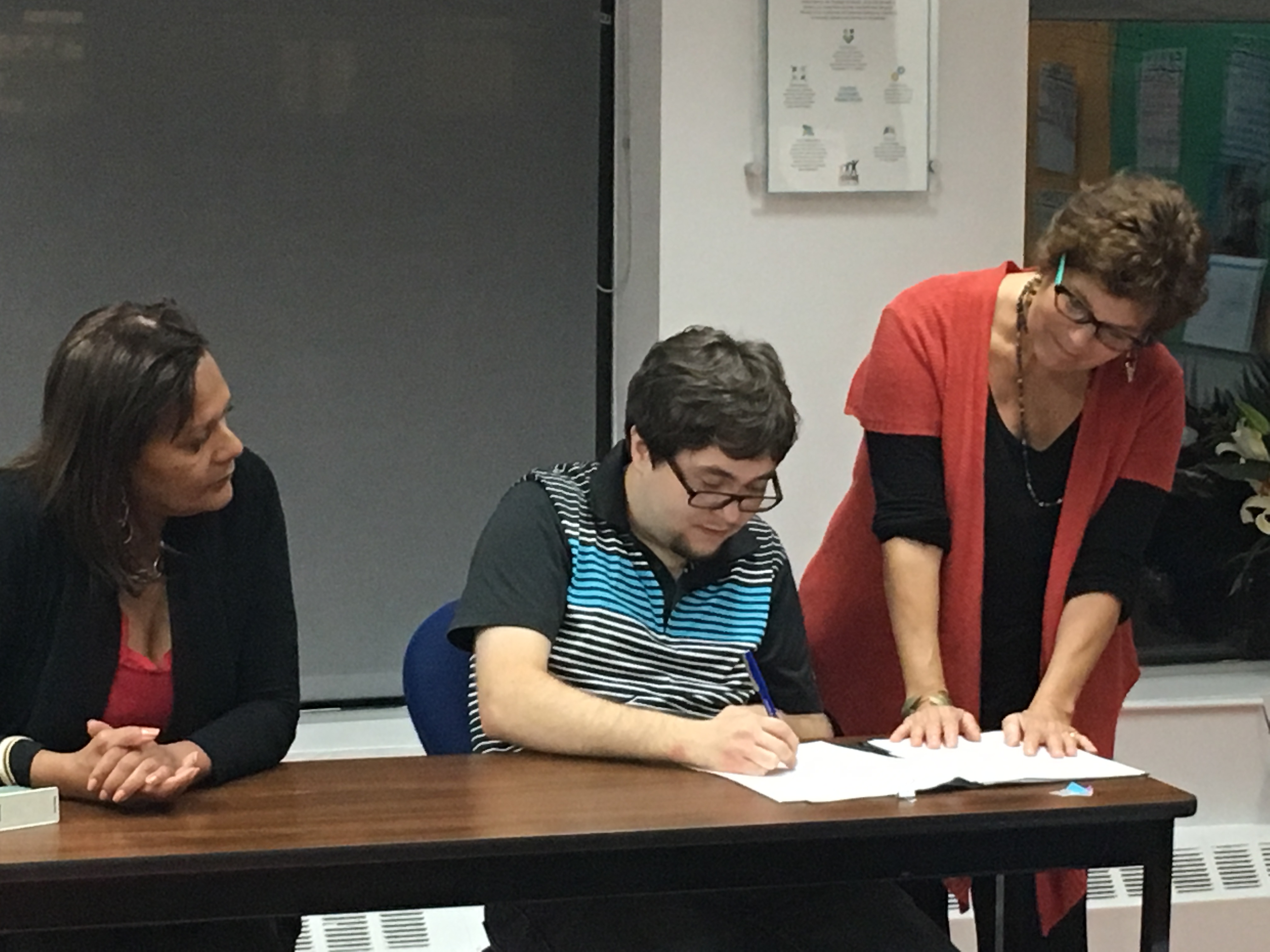
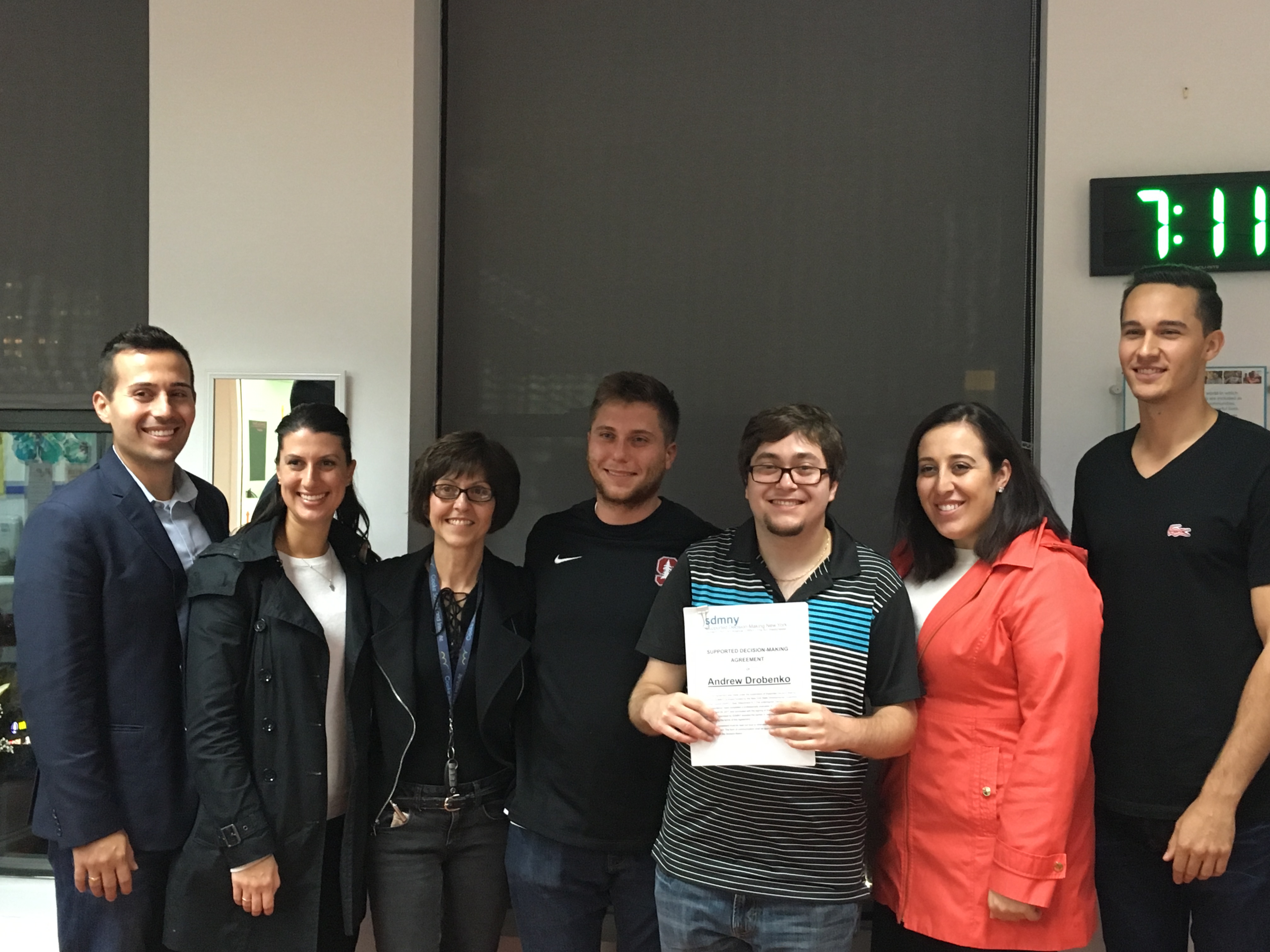
When people with intellectual or developmental disabilities choose trusted persons to support them, in whatever ways they need, in order to make their own decisions, they are engaging in “supported decision-making” or SDM. Often this happens informally, but SDM may also be a more formal process in which the person with an intellectual or developmental disability and her or his supporters enter into a contract or agreement called the Supported Decision-Making Agreement or SDMA.
Why?
You may be fine in making the choices for your child for their life choices. What happens after the inevitable and we are not here to make decisions for our students? Do they turn over all their rights to someone else? Consider the following;
People with a disability should:
- be able to make decisions about things that affect them
- be able to explore, express and act on their values through decision making
- receive information and support that helps them make decisions
- have their attitudes and values heard and respected
People with a disability should:
- respect the right of other people to make their own decisions
Disability support providers should:
- ensure workers understand the legislation and policy supporting the right of people with a disability to make decisions
- ensure familiarity with self-directed approaches
- provide leadership to staff on expected behaviors and organizational values with regard to decision making
- foster environments where workers are comfortable supporting decision making by people with a disability
Disability support workers should:
- encourage people with a disability to make decisions
- facilitate situations where people with a disability can make decisions
- assist people with a disability to find the information they need to make decisions as required
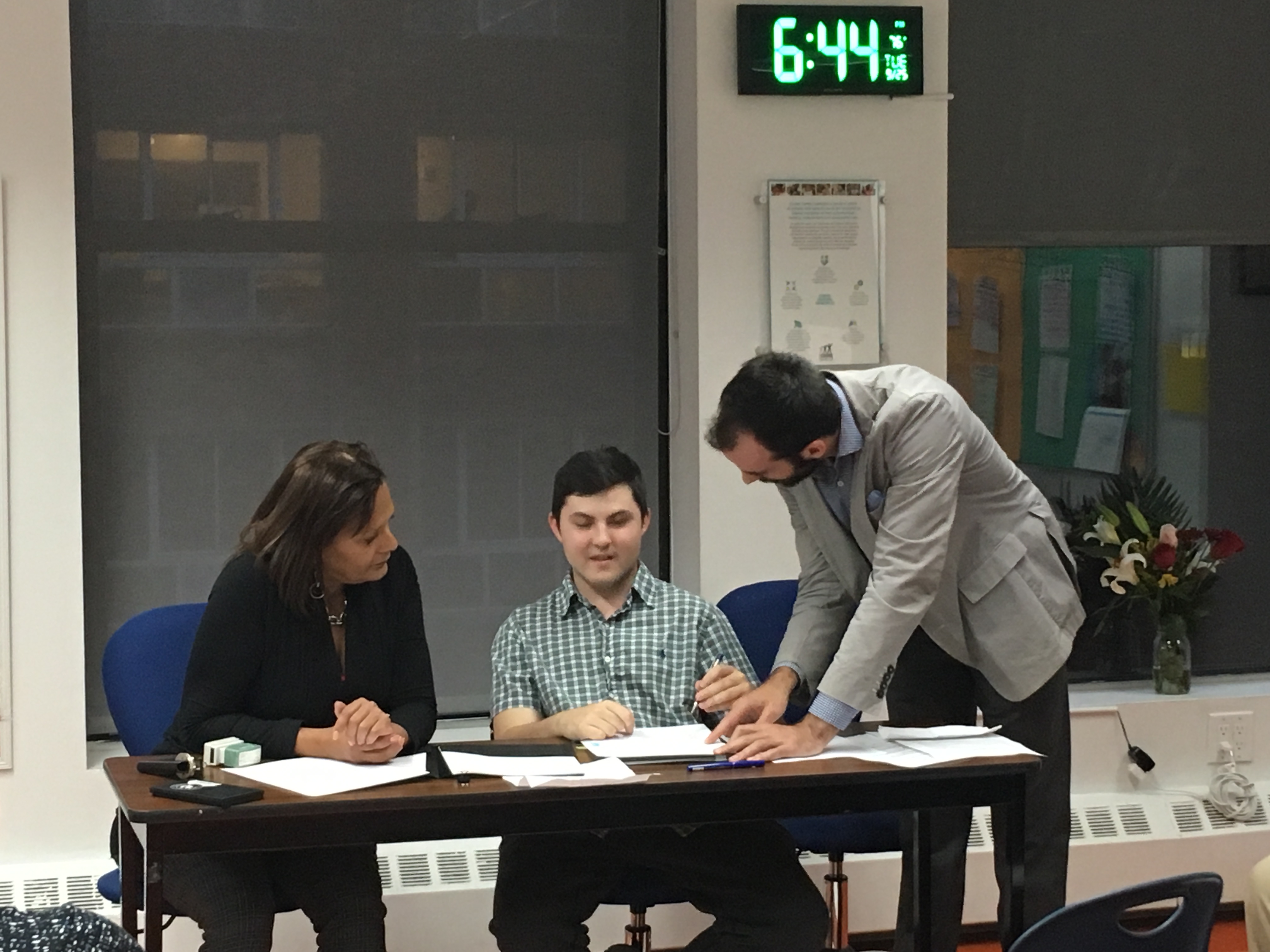
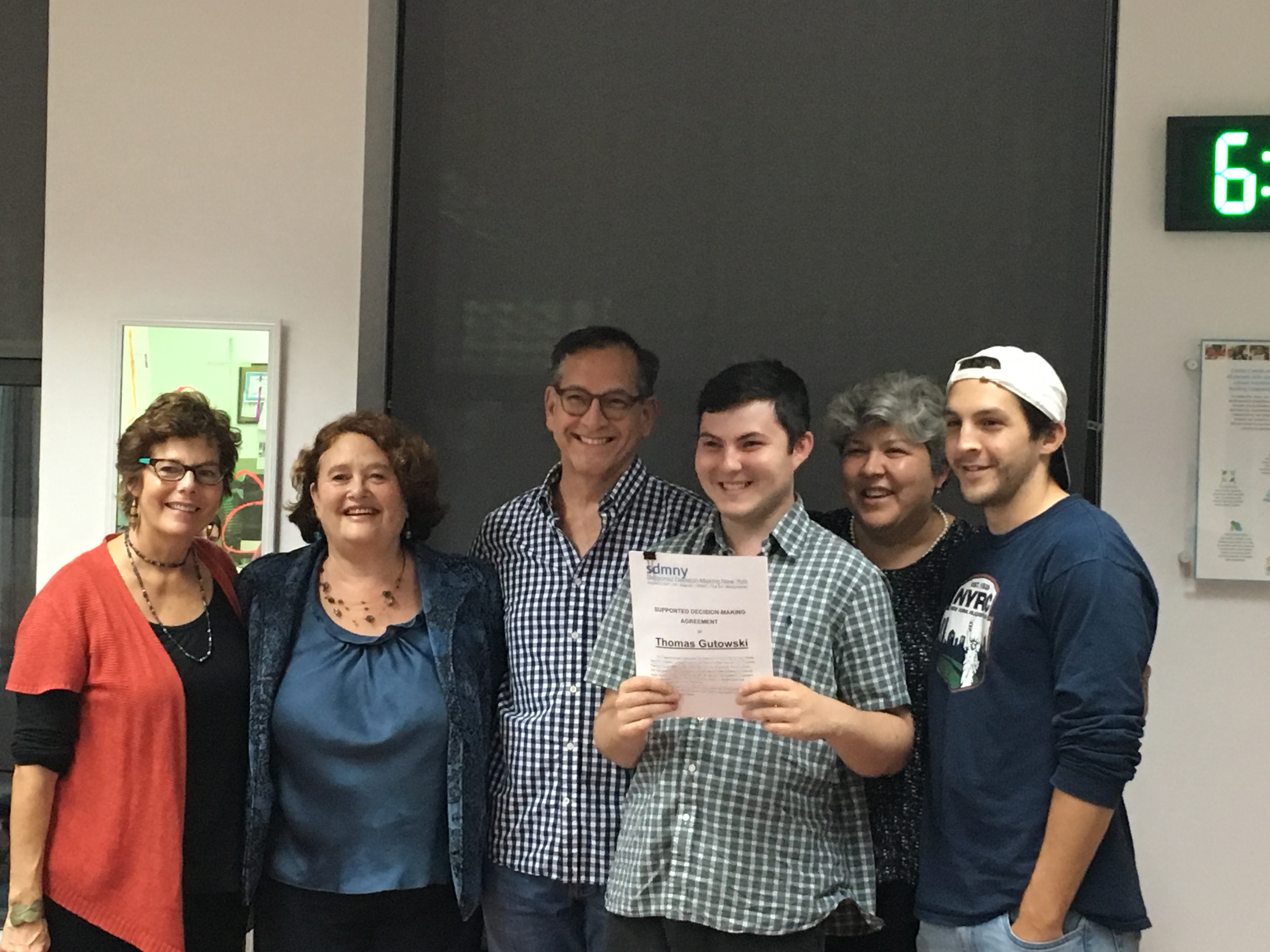
To ensure the acknowledgment of basic rights of all individuals the support structure allows for many voices to help make the best choices for our students, not just one person or a state agency.
When Dr. Termini and I first met with officials to discuss, I think we both had the same reaction. “What if my child breaks his arm and refuses service? Or what if my child only spends money on video games? How can we let our students make all the choices for themselves?” Scary, yes, but those question are not without answers. Medical waivers and other contingencies can ensure the fiscal, health, and emotional safety of our students.
The SDMNY Project, a partnership between Hunter College/CUNY, the New York State Association of Community and Residential Agencies, Disability Rights New York and Arc of Westchester, and funded by the New York State Developmental Disabilities Planning Council, promotes supported decision-making as an alternative to guardianship. Supported decision-making is a process where an individual can arrange for specific people (family, friends and experts) to help them explore their options when making decisions. The project hopes to increase awareness and develop a formalized process that spells out the rights and obligations of people with I/DD and a variety of self-selected supporters, including family members, friends or trusted experts. “Supported decision-making enables students to ask trusted people in their lives for help or advice, just as you or I do, when making important decisions or even day-to-day decisions that may seem minor. They can do this instead of giving up their rights through guardianship,” said Katie Riordan, Cooke SKILLs Division Head.
The Trouble with Goldfish
I just finished a bag of Kettle Chips, so maybe I am not the one to write this. However, I am an adult (age wise, maybe not behaviorally) and have made my own bad choices. When it comes to feeding our children, we all agree that sometimes it is, “Do as I say, not as I do.” I don’t finish bags of chips in front of my daughter and try to set a good example. And please, this is not meant to criticize anyone. I am as guilty as the next of often choosing convenience over healthy choices – but if we can find a balance it will make a world of difference in the health of our students.
As I walk through the halls of the schools during snack time I am often surprised that at 9 am kids are opening bags of chips, and downing Costco sized bags of Goldfish. Grammar school provides healthy snacks for all students, but the lure of those Doritos often is too strong to avoid. Cookies, Mini muffins, processed chocolates on a daily basis can have serious impact on the health of a child. Maybe a bag of Doritos can come once a week, not every day, and certainly should not be consumed for breakfast.
The other problem is with modern advertising we are often lost as to what is healthy. Take the most popular children’s snack Goldfish for example.
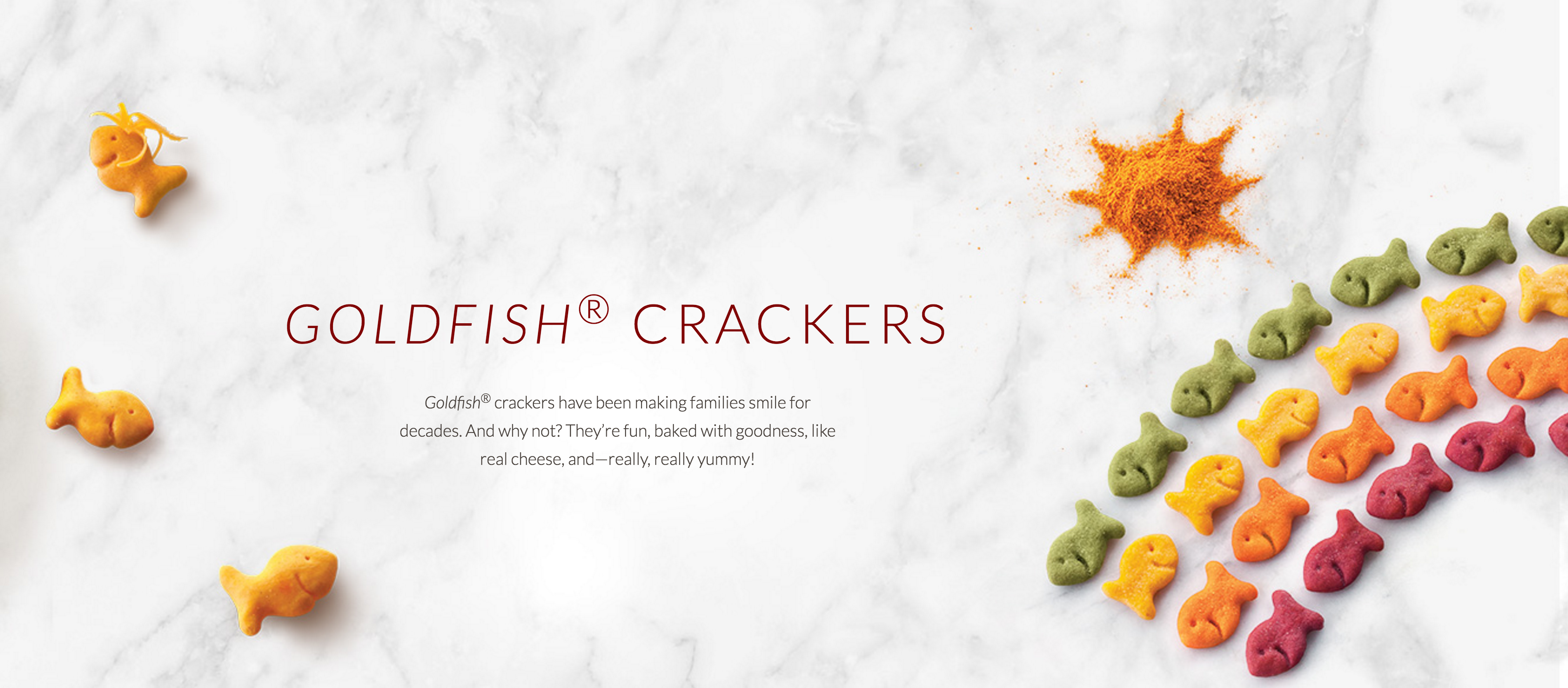
Goldfish crackers are advertised as containing no artificial preservatives and 0 grams of trans fat. They are fortified with Vitamins B1, B2, folic acid, calcium, and iron (all are synthetic sources). According to the label, some Goldfish crackers contain real cheddar cheese and natural ingredients. Looks good no? Keep reading.
Here is a list of the ingredients on Goldfish.
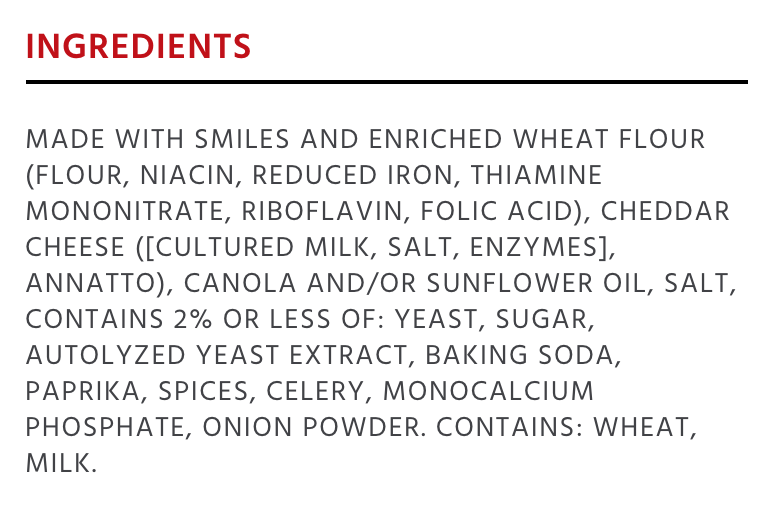
- Annatto vegetable oils. These vegetable oils contain GMO (genetically modified organisms). Back in 2012, the company “Pepperidge Farm has been sued in Colorado for claiming that its Goldfish crackers are “natural” when they contain ingredients derived from genetically engineered soybeans.” Research suggests GMO soybeans could potentially be harmful to liver functions, damage the liver and cause toxemia, meaning the soybeans may contain toxins that could poison the bloodstream. In another recent study in Russia, it was discovered that GMO soybeans could potentially be harmful to infants and cause infertility problems.
- Goldfish Crackers Contain MSG. Next, in the ingredient list, you will find “Autolyzed yeast”, which is a flavor enhancer also known as MSG or monosodium glutamate. Some people tend to be more sensitive to MSG than others and some of the side effects of autolyzed yeast include headaches, nausea, sweating, and chest pain. There is a lot of controversy regarding MSG (monosodium glutamate) out there. Some claim it is dangerous, some say it’s a myth. I found a good meta-review of MSG effect. There is a lot of evidence that it overstimulates the nervous system. Also make sure your snacks do not contain Yeast Extract.
https://www.foodrenegade.com/msg-dangerous-science/
- The Goldfish crackers also contain high amounts of sodium, 250 mg per serving. In both children and adults, high intake of sodium can have dire side effects, including cognitive degeneration, kidney damage, high blood pressure and heart problems.
Follow this link to see some healthy alternatives. Amazon delivers almost anything so they are not hard to find anymore.
https://healthbeginswithmom.com/wp-content/uploads/2017/05/80HealthySnackIdeasForKids-1.pdf
Check out these sites for more ideas!
https://www.pcrm.org/health/diets/vegdiets/healthy-snacks-for-kids
https://kidshealth.org/en/parents/snacking.html
https://www.webmd.com/food-recipes/features/secrets-of-healthy-snacks-for-kids



